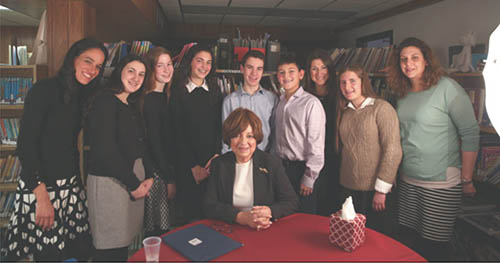

Approximately 750 guests assembled on Tuesday evening, May 31, at the Frisch School auditorium for the fourth Moriah “Names, Not Numbers” documentary film viewing and program. Created by accomplished educator Tova Fish Rosenberg 12 years ago to enable young students to “sit opposite survivors of the Holocaust and ask them questions. ‘Names, Not Numbers’ is a history-making project which we are privileged to engage in while we still have survivors in our midst.”
The evening was introduced by Moriah Head of School Rabbi Daniel Alter, who reminded the students that they are the last generation for whom the Holocaust is a memory and not simply history.
Rabbi Shmuel Goldin, Rav of Congregation Ahavath Torah of Englewood, who co-taught the program’s background history component with Moriah English instructor Rachel Schwartz, spoke next, “As the clock moves forward, these precious days of recollection will become rarer.”
Of the nine survivors who participated in the program, six are relatives of the students participating and two others have had children and grandchildren at Moriah.“This connection added even more meaning and emotion to the experience,” according to Schwartz, the Project Director, “as for many of the participants this was actually the first time that they heard the stories of the survival of their grandparent and in some cases great-grandparent.”
The program entailed a serious commitment of time and energy by the students according to Schwartz. “The students attended an 11-week course which provided a general historical background of the Holocaust. From November to January, the students received the identities of their survivors and proceeded to research their specific backgrounds including countries of origin and how, when and to what extent they were impacted. By January they had created three sets of questions for their individual survivors regarding their lives before, during and after the Holocaust.”
In January, the survivors and students came face to face. In the documentary, it was clear that there was great excitement coupled with a bit of anxiety as the students congregated at the glass entrance of the school to watch the survivors emerge, some with family members, from their cars.
The nine survivors engaged with the students in emotionally charged question-and-answer exchanges. There were moments of painful memory, horrifying images and the inevitable tears on both sides. The young students were totally engaged with their interviewees. As some students asked questions, others used the filmmaking techniques they had been taught to capture telling expressions and body language.
From the initial interview in January until just a few weeks ago, the students were tasked with taking those 60-minute interviews and reducing them to 15 minutes and eventually 8 minutes of oral history.
This year the students were assisted in their interviewing skills by Sara Lee Kessler, a journalist and former Moriah parent. Sandra Stacic, creative filmmaker, who has worked with “Names, Not Numbers” for several years, teaching students the art of filming. The documentary was interspersed with powerful footage and mood-appropriate background music as it traversed back and forth from survivor to survivor in response to the questions posed by the students.
The survivors participating this year represented many different harrowing Holocaust experiences from their places of birth, escape routes, incarceration conditions and eventual liberation. The fact that most of the survivors were joined in the project by grandchildren and even great-grandchildren made their stories even more poignant. Shmuel Goldstein, native of Czechoslovakia, whose granddaughter Maya Goldstein was one of his interviewers, was deported as a 3-year-old with his family, which fled to the mountains and survived in a hollowed tree. Minia Gdanski, native of Poland, was joined by two great-grandchildren, Isaac and Menucha, who were part of her group. Alex, a third great-grandchild, is a current student at Moriah. Alex Konstantyn, native of Poland, who was hidden by righteous gentiles, was joined by his granddaughter Orlee Rosen. Luba Schulsinger, native of Poland, who spent the war years hiding in forests, was joined by great-granddaughter Bailey Lerman. Judy Kranzler, born in Hungary and one of the survivors of the Kastner Train, is the grandmother of several Moriah graduates. Leah Lichtiger, who was incarcerated in Bergen Belsen, is the great-grandmother of current Moriah lower-school students. Sonia Kravetz, a native of France, who was hidden by gentiles during the War, is the grandmother of Eliana and Menachem Kravetz, who were participants in the program. David Lipman was an American liberator and Jerry Stein, native of Czechoslovakia, survived the Auschwitz Death March. Stein’s daughters were former students at Moriah.
Parent Abby Hirschman brought “Names, Not Numbers” to Moriah and has worked to ensure its continuance in years to come. Hirshman feels strongly that, “through this program, our students are sensitized to their Jewish identity because the survivors faced unspeakable atrocities solely because of their Jewish faith.”
By Pearl Markovitz









